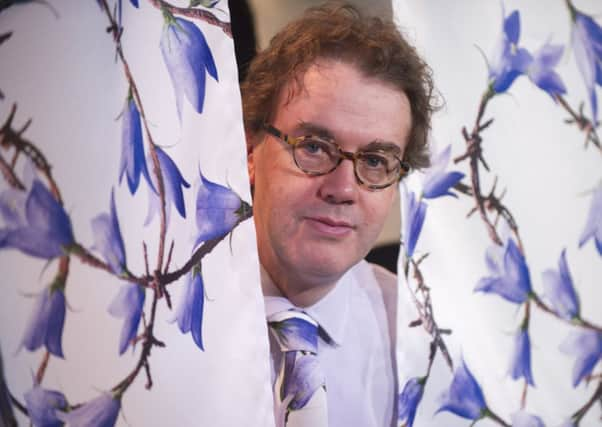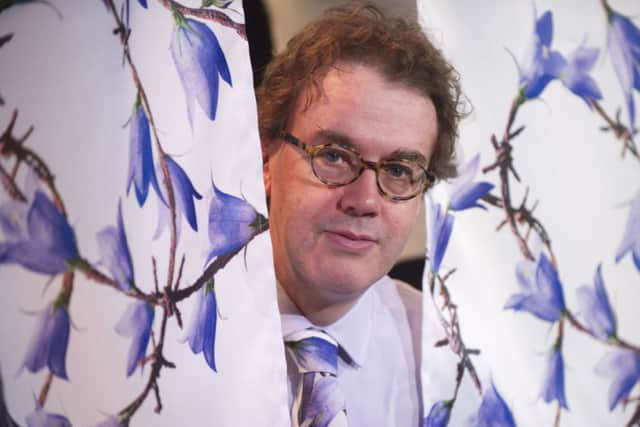Edinburgh International Festival 2014 unveiled


Centuries of world conflict, warfare and unrest will take centre stage at this year’s Edinburgh International Festival as its director steps down with a powerful and provocative programme.
Sir Jonathan Mills, the Australian impresario who has been at the helm of the event for the last eight years, yesterday unveiled a swansong line-up that will also mark 20 years of democracy in South Africa through major music, theatre and dance works and celebrate Glasgow’s hosting of the Commonwealth Games.
Advertisement
Hide AdSir Jonathan said this year’s main theme would take the Festival back “full circle” to its roots, when it was instigated in 1947 by civic leaders to provide a “platform for the flowering of the human spirit”, just two years after the Second World War.


But, as Sir Jonathan hinted last summer, there is no mention of the independence debate in the programme, despite voters going to the polls less than three weeks after the Festival finishes.
However, he insisted the event would be tackling key questions of “identity, history and values”, and pointed to The James Plays, a brand new trilogy set during the reign of three
different kings over an independent Scotland during the 15th century, which The Killing star Sofie Grabol will appear in.
Highlights for August’s event include a dance extravaganza inspired by a Hindu conflict dating back thousands of years, Russia’s Mariinsky Opera company tackling 19th-century opera The Trojans, and a showcase of work by Federico Garcia Lorca, an
artist who was executed at the start of the Spanish Civil War.
Advertisement
Hide AdPacifist composer Benjamin Britten’s famous War Requiem and the television opera he wrote against the backdrop of the Vietnam War both feature in the programme, while the harrowing German novel All Quiet on the Western Front will be brought to the stage by Hamburg’s Thalia Theater company.
There are plays set in Paris at Christmas time just before the First World War and in Vancouver in the immediate aftermath of the Second World War, while an Australian theatre company will stage a surreal comedy-
Advertisement
Hide Addrama following an elephant god’s attempts to reclaim the swastika from the Nazis.
The South African element will include a “human installation” in Edinburgh University’s Playfair Library exploring racist attitudes – and drawing inspiration from real-life “human zoos” staged in Europe in the 19th and 20th centuries.
Among the biggest stars of the festival will be Ladysmith Black Mambazo, the male choir which shot to fame after recording with Paul Simon, who will be performing in concert and also staging a dance spectacular with dancers from the Royal
Ballet and Rambert companies.
Sir Jonathan, who will be staying in Edinburgh for another four years to write a new opera and take the helm of three international cultural summits, said: “When I thought about this year and the dual opportunities of the Commonwealth Games and the centenary of the First World War, it was exciting.
“It was also important to
acknowledge a festival forged in the immediate aftermath of war and also be able to reflect on the relationship between artists in times of peace and conflict.
“It is quite surprising when you start to look at how artists have responded to war and
Advertisement
Hide Adconflict. It’s not actually the case that artists are at their most negative or self-doubting in these moments. Quite often, it is at the darkest of times that artists can be at their most transcendent and sublime.”
Sir Jonathan found himself at the centre of a furious row last year after declaring that there would be nothing in his final programme directly tacking the Scottish independence debate, blaming uncertainty over the timing of the poll when he was planning the Festival but also insisting the event had to be
“politically neutral”.
Advertisement
Hide AdHe said he was “genuinely misunderstood” last year, but added: “I stick to what I said then. We have a very different way of engaging with contemporary discussions.
“I believe there are many ways in which we are engaging with this particular discussion, but we are not doing it in a literal way. We are not seeking a political mandate or trying to get elected.
“What we are doing, though, is presenting ideas, particularly in the case of The James Plays, which have the advantage of being very relevant to contemporary issues which Scotland faces and perceptions of our
relationships with each other and the rest of the UK, as well as offering a historical perspective that shows how we’ve framed our identity and existence, not just over the last 20 or 50 years, but over several centuries.”
HIGHLIGHTS
Les Troyens,
Festival Theatre, 28-30 August
One of just two large-scale opera productions this year, but the epic adaptation of Hector Berlioz’s 19th century opera, charting the epic battles between the Greeks and the Trojans, will see Mariinsky Opera, from St Petersburg, perform for five and a half hours.
Owen Wingrave,
King’s Theatre, 15-17 August
Aldeburgh Music revive Benjamin Britten’s controversial pacifist opera, about a military cadet’s decision to reject the life of a soldier, which the composer wrote when the US intervention in Vietnam was dominating the news agenda.
The James Plays,
Festival Theatre,
5-22 August
Advertisement
Hide AdSofie Grabol, James McArdle and Blythe Duff head the cast of Rona Munro’s brand new trilogy of plays – staged by the National Theatres of Scotland and Great Britain in their first major collaboration – exploring the tumultuous rule of the Stewart kings over Scotland in the 15th century.
Ganesh Versus The Third Reich,
Royal Lyceum Theatre, 9-12 August
Australian theatre company Back to Back – whose ensemble is drawn from actors with disabilities – create what is billed as the festival’s “most curious” play this year, revolving around an elephant-headed Hindu god travelling through Nazi Germany to reclaim the swastika.
Front,
Royal Lyceum Theatre, 22-26 August
Advertisement
Hide AdThe Thalia Theater company, from Hamburg, looks at the horror which unfolded in the trenches in the First World War, partly inspired by the famous German novel All Quiet On The Western Front, which describes soldiers’ incredible physical and mental stress.
The War,
King’s Theatre, 9-11 August
The world premiere of a new co-production between the EIF and the Chekov International Theatre Festival set in Paris just before and then during the First World War, focussing on a group of young artists forced to re-examine their beliefs and principles as the reality of the conflict unfolds.
Ubu and the Truth Commission,
Royal Lyceum Theatre, 28-30 August
Testimonies from the post-apartheid Truth and Reconciliation Commission provide the inspiration for the production by South Africa’s Handspring Puppet Company, best known for their work on War Horse.
Inala,
Edinburgh Playhouse, 10-12 August
Ladysmith Black Mambazo, the choir hailed as “South Africa’s cultural ambassadors” by the late Nelson Mandela, join forces with dancers from the Royal Ballet and Rambert companies for a one-off collaboration to mark both 20 years of democracy and Glasgow’s hosting of the Commonwealth Games.
Gnosis,
King’s Theatre, 19-21 August
The legendary Bengali dancer and choreographer Akram Khan, who masterminded one of the most striking sequences of the London 2012 opening ceremony, returns to the ancient Indian story Mahabharata, with which he began his stage career at the age of 14.
Exhibit B, Playfair Library, 9-24 August
South African director Brett Bailey takes over Edinburgh University’s prestigious space for a human installation, which will see black performers appearing in “curiosity cabinets” highlighting issues of European racism towards Africans from the 19th century to the present day.
BBC Scottish Symphony Orchestra,
Usher Hall, 30 August
Advertisement
Hide AdOn the penultimate day of his last festival, Sir Jonathan Mills will finally have one of his own pieces performed at the event – one he wrote inspired by his father’s prisoner-of-war experiences and the huge loss of life his countrymen suffered in Borneo in 1945.
Songs and instrumental music from Terezin,
Queen’s Hall, 25 August
A concert of the remarkable music produced at the notorious Nazi concentration camp at Terezin – where Czech musicians, composers, writers and artists were allowed to both create and perform, providing a form of escape for the other inmates. Featuring mezzo-soprano Anne Sofie von Otter, right.
Ute Lemper,
Usher Hall, 15 August
The German singer and actress joins forces with the Scottish Chamber Orchestra for a one-off concert of music from the Weimar Republic era, including some of Marlene Dietrich’s most famous songs.